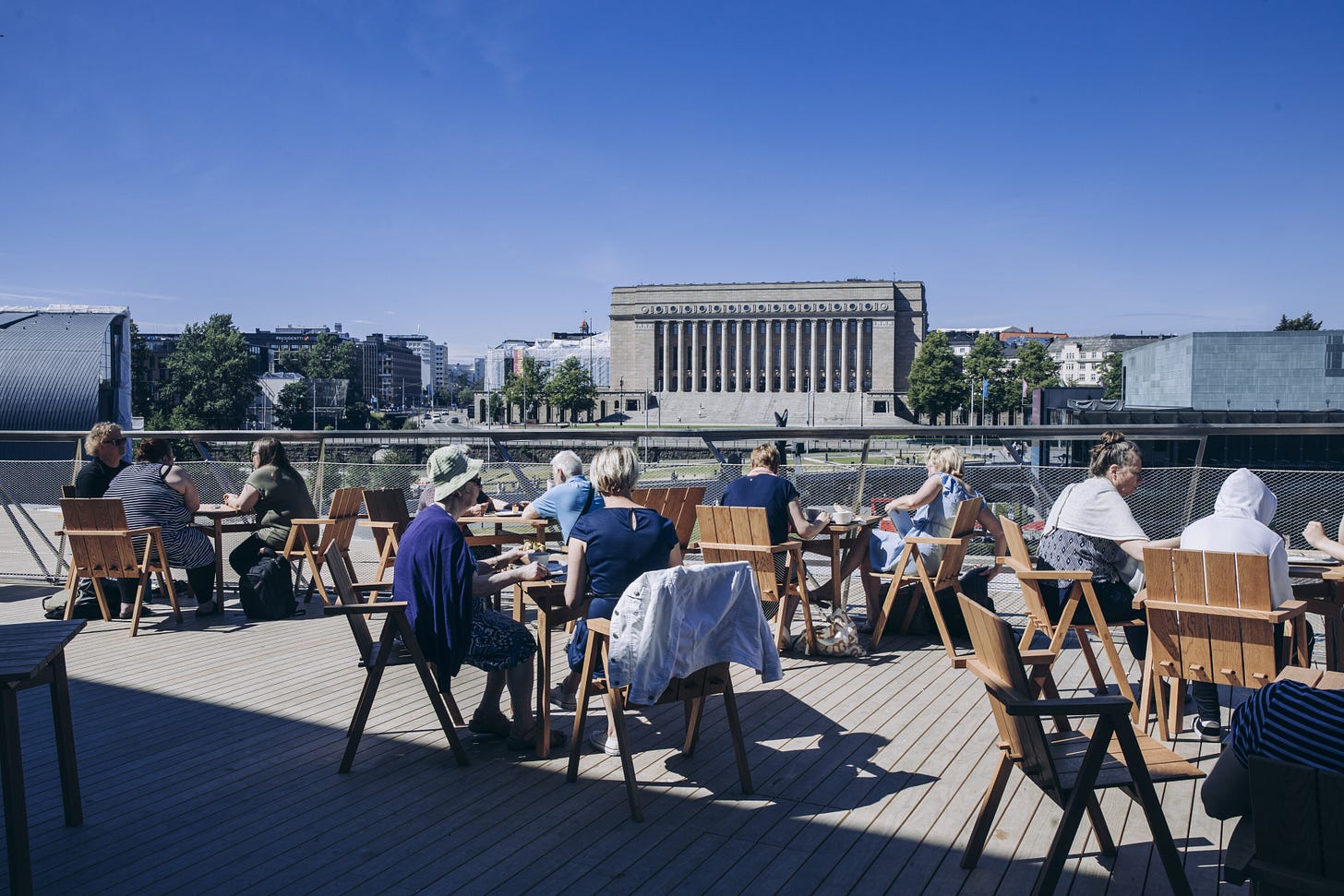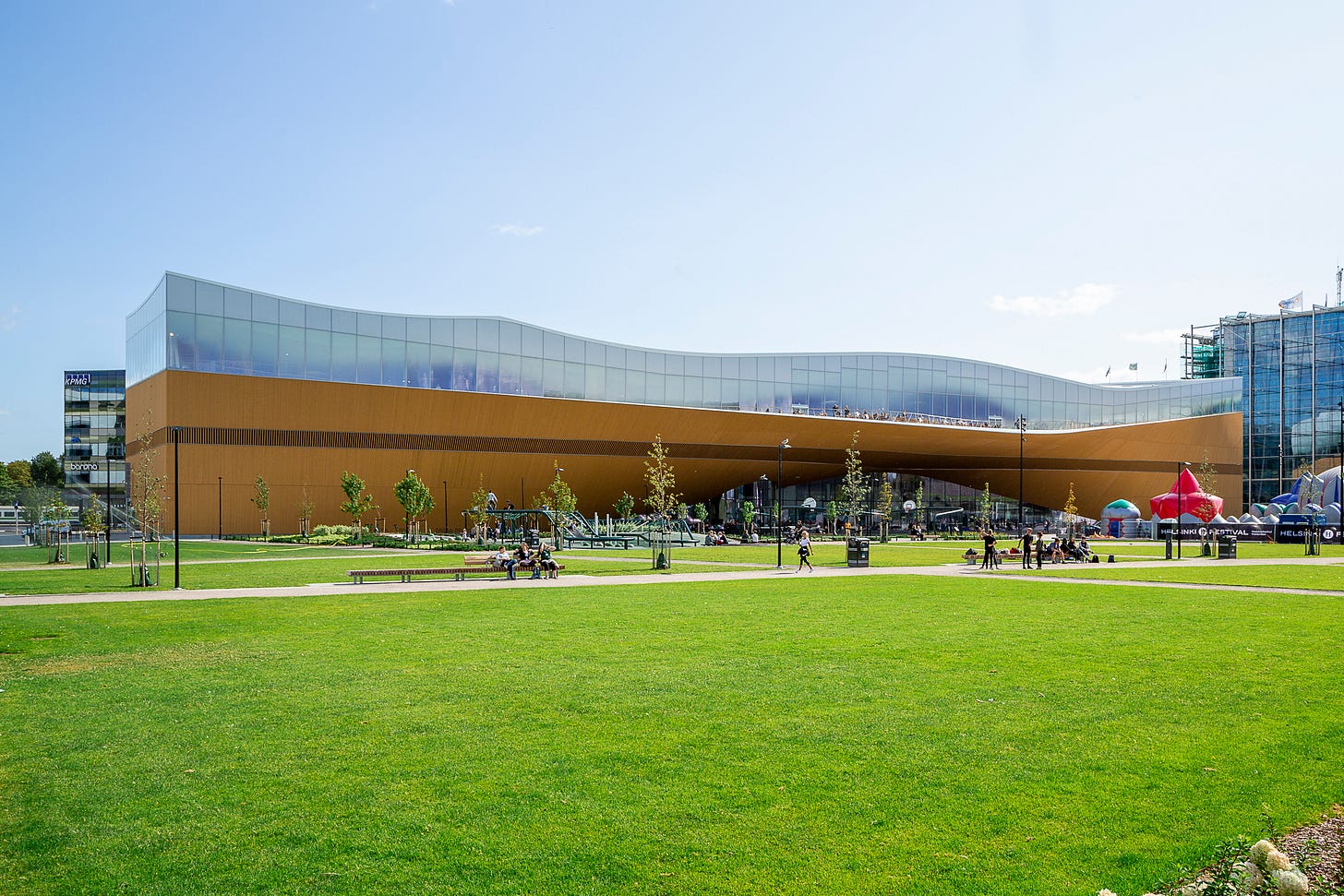Shared Leadership at Oodi
In Helsinki’s Central Library Oodi, employee teams make decisions on services and programs. Managers step in only when needed. Oodi’s Director Anna-Maria Soininvaara explains how it works.
One of the basic ideas of a public space is that we never know who shows up today. Even when an event is well produced with world class speakers, it might be that no one shows up due to competing interests, poor communication, a public transportation strike, bad weather, or just laziness. Or an activity designed for a handful of people might suddenly have a line of curious people around the block. Or aggressive bvehavior by a visitor having a really bad day results in calling the police.
People come to public spaces with highly diverging and rapidly changing interests. Most importantly, the same person might have completely different expectations today than yesterday. While yesterday they were looking for a quiet place to read, today they are joining a discussion, meeting a friend for coffee, or bringing in their toddler to release some energy. While being the same person coming to the same place, from the service provider’s point of view they are a different sort of customer. When public spaces work well, they enable this self-determination and accommodate highly different needs.
Public Sector Organizations Need Convivencia Practice
Over the last few years, my research and development has focused on the idea of convivencia. Convivencia is a Spanish word for the capability for coexistence across differences and uncertainties. Convivencia could be described, like in the image below, as a space between harmony and conflict where our goal is not to subsume conflict or dissolve differences but to find pragmatic solutions to rapidly changing situations and value differences.
(Side note: Many organizations and researchers use the English term conviviality. I have decided to use the Spanish term as it carries a stronger recognition of friction. More on that on a future newsletter.)
One of the main findings from my fellowship research at the Bloomberg Center for Public Innovation at Johns Hopkins on public spaces around the world was the need to practice convivencia in public space organizations. The growing complexity and uncertainty of public life requires intentional practices that support 1) attentiveness to people’s diverse behaviors and interests, 2) willingness to learn new ways of working by doing things differently and in collaboration with partners and residents, and finally, 3) a commitment to constant reconfiguration. Public space organizations grounded in the reality of urban life understand that a library, a park, a plaza, or a museum is never finished. That it requires constant nurture and care.
One of the organizations I have found highly inspiring on this convivencia practice is Helsinki’s Central Library Oodi.
Example: Community Governing in Oodi
Oodi was opened to the public in 2018. It quickly became one of the most diverse and popular places in the Finnish capital. The library is easily accessible from all parts of the city and next to the editorial office of the biggest newspaper in the country, which means that irregularities, happy accidents and problems at the library make it to the media faster than to City Hall.
On a regular day, Oodi welcomes 6,000-8,000 visitors ranging from tourists, senior residents reading a paper, unhoused Roma people needing to charge their phone, groups of students working on a project, and children hanging around at the library either with friends, parents, or by themselves. The residents of Helsinki have a strong sense of ownership over Oodi. They want to utilize it to the maximum. For many Oodi is not “just” a space. Like a friend of mine wrote on Facebook:
”I have not been great in playing with my child. But Oodi makes me feel like I am a better dad.”
In March 2024, Oodi celebrated passing the mark of ten million visitors. This 10,000 square meter, three-floor public facility open 8AM-9PM on weekdays and 10AM-8PM on weekends is run by a staff of only 70.
What I have always found remarkable is how the team in Oodi has challenged traditional ideas of how a public organization operates while being part of and in full compliance with the City of Helsinki, the largest employer in the country with around 37,000 employees.
Work in Oodi is built on a practice of community governing. This means that the staff have the right and responsibility in five teams to make decisions over services and programs. The role of managers is to help teams when needed but not to make decisions for them.
Oodi’s working culture is inspired by the self-managing principles of Buurtzorg, a Dutch homecare provider where nurses and other care staff make decisions over their work in teams.
Oodi Director Anna-Maria Soininvaara: “You can't command people to do certain things. You have to persuade and inspire.”
Several academic studies and employee satisfaction surveys (example) show that Oodi has had a higher than average employee satisfaction and that staff members feel that they are trusted and supported. I talked to Oodi’s Director Anna-Maria Soininvaara about how this model works and why. She has seen all stages of Oodi from leading its concept development to now acting as its Director for over five years.
How would you explain what community governing means?
Oodi offers a higher degree of freedom than many other workplaces. All of our development happens in staff teams. We favor experiments as long as they are in line without values and our duties articulated in the Library Act. The starting point for ideas is usually 'yes’.
How does community governing work in practice?
The employees are divided into five development teams: Children and Youth, Content, Customer Experience, Digital Services, and Facilities and Participation. The teams prepare decisions on what services are offered and what to develop. A group of staff members plan the work shifts for the next three weeks with the support of one manager. The teams also specify training needs based on their services and development. The only place where supervisors step in is when teams cannot decide among themselves.
It is important to note that everything we do is not development. This means that while people have their specialities and belong to the development teams, they do not work only within their team. Everyone works shifts all over the building with members from the other teams, based on decisions taken by the other teams. To give an example how the community governing works in practice: on weekends when Oodi has easily 8,000 visitors a day, the staff on shift work together as one team without a supervisor.
Changes that influence everyone, for instance in customer service practices, are prepared by the five development teams and approved in weekly staff weekly meetings. We always hold two identical meetings to ensure that people working on different shifts can attend. A team proposes a need, then there's a discussion and, if necessary, a vote. Bigger financial investments and improvements are also openly discussed in staff meetings. Since we use public funds, decisions can't be made based on just one team. Often the teams disagree a lot on the priorities.

What does this mean for staff?
We don't have any backroom planner positions. All development happens within teams and with customers. Time for development is allocated to anyone interested, although some do more than others, of course. For example, our information specialists [staff members with a Master’s Degree in Information and Library Science] take care of annual planning and integrating annual performance goals into work.
Oodi is part of a massive, hierarchical public sector organization. What does it mean to be a manager at Oodi?
All our managers are committed to the community governing model. That is important as the model is demanding for front-line managers because you can't command people to do certain things. You have to persuade and inspire. Often the team is also not excited about the supervisor's ideas. As a supervisor, you have to avoid applying pressure. At the same time you have to encourage people to take agency.
Community governing requires not immediately solving things yourself. Instead of proposing a solution, you ask what staff members think. Of course the managers help staff in decision making when needed. Community governing is not about being difficult or avoiding responsibility.
What we have learned is that the model requires a lot of encouragement for decision-making. I sometimes have to emphasize that staff members should argue against my ideas. That this idea isn't better just because it comes from me as a leader.
You also have to dare to trust. If there's an exceptional or problematic situation, as often happens, you can't define the whole team's actions based on that.

As the Director of Oodi, you oversee the managers. What does this mean for you?
I often provide what I would call authority and bureaucracy services because we are part of a functional and hierarchical organization [City of Helsinki]. In traditional hierarchical organizations, everyone cannot contact people outside the organization or even across silos. This sometimes leads to Oodi's staff not being listened to in partnerships. I notice that many potential partners directly contact or want to contact me. What I do is filter out the nonsense before passing suggestions from existing or potential partners on to the teams.
How did this leadership model emerge?
The City of Helsinki has an Executive MBA program for its senior leadership organized by the Aalto University’s Executive Education. I participated in the program and read about the Buurtzorg operating model. I talked about it with our managers and everyone was enthusiastic about it. Our Service Manager Laura Norris has led this development with Helsinki-based consultancy Prominda.

What has been difficult?
The pandemic greatly impacted this leadership model. Just as we had learned to make decisions collaboratively, there were very strict guidelines about social distancing and other measures. After the pandemic, we had to start over. It has not been fast.
When choosing development projects, there is always the balancing act between people’s personal interests, how much our limited resources can be stretched and what is our mission.
There have been many discussions about doing more cultural events, such as music. But we often come back to the fact that there are other departments in the city’s organization for that while promoting reading and literature is definitely the core of our activities.
At the same time this model requires making a difference between development and daily operations. Otherwise the idea of development leads to chaos where everything becomes development.
What has been the impact of this culture?
We are at a good level in terms of well-being at work regarding meaningfulness and mutual assistance. But there's a lot of mental burden. While the model has great advantages, it does require a lot from staff members.
This model puts a lot of emphasis on the ability to make fair decisions collaboratively. This isn't easy. We are now introducing coaching for four out of our five teams regarding communication and considering how to improve the model.
Also, as a public employer we have a lot of staff members working part time due to health and other reasons, which causes fluctuation in organizing the work, next to the unpredictability created by the nature of our work and our customer volumes.
All and all, Oodi is both a fun place for customers and staff but quite noisy. And yes, as a result of this model, some pretty crazy things have been done.
But the great advantage is that we have the ideas of 70 people at our disposal. The ideas coming from people in direct interaction with customers are fresh. Work is also more meaningful when you can influence it.

To conclude…
Anna-Maria Soininvaara is the first one to say that the community governing model is not perfect. But as everyone who has ever worked in a big organization, neither is the traditional hierarchical model. All management models require constant improvement and development.
The biggest lesson from Oodi is that things can be done differently even in big, traditional organizations, like local government. And especially when employees work in busy and unpredictable circumstances, building a culture of mutual support and personal agency is a more reliable model than relying on a manager to solve all situations or trying to come up with a rule for everything.
Oodi’s management culture is an example of what I would call convivencia practice, creating leadership practices that meet the needs of public spaces.









